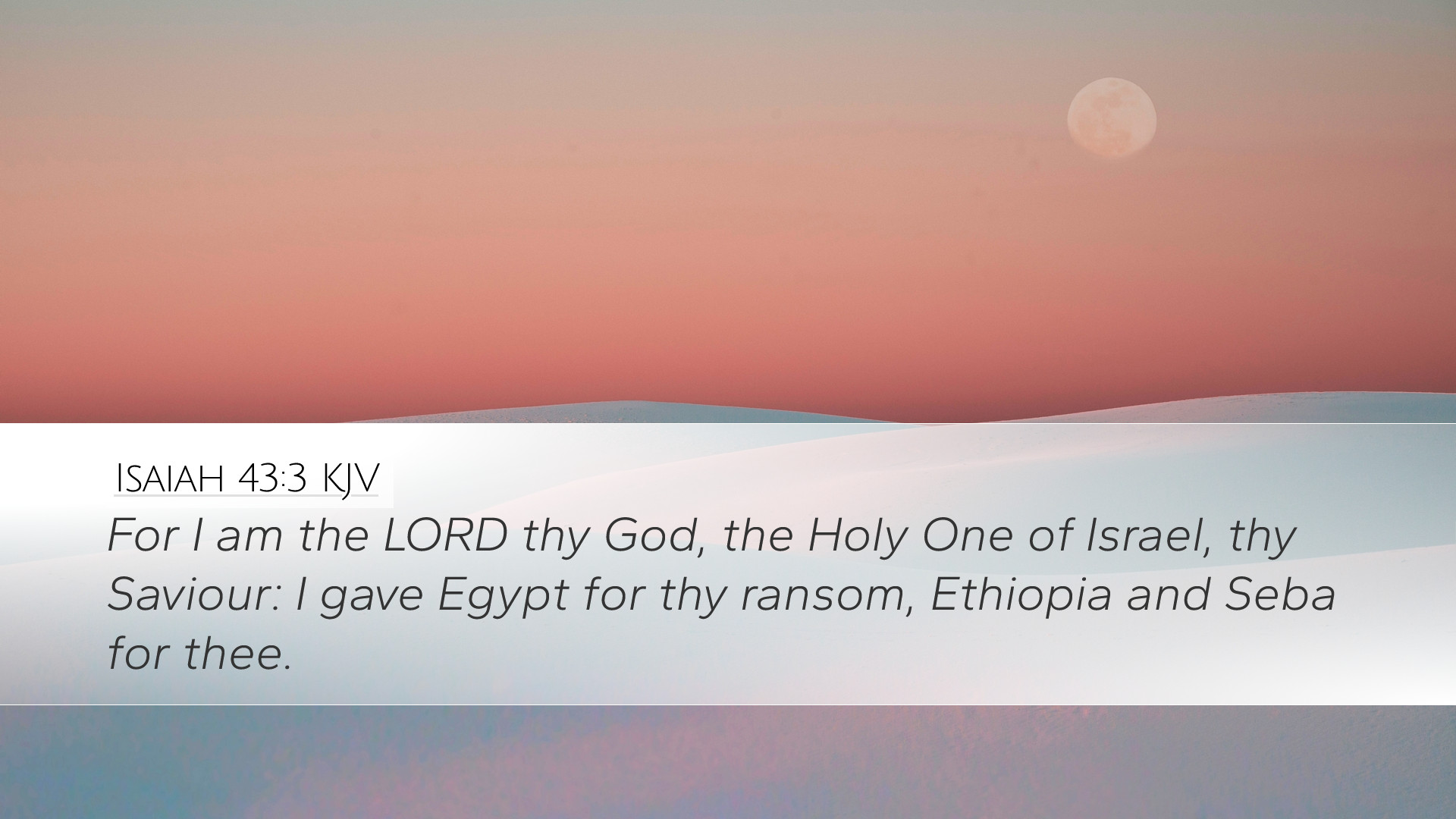Commentary on Isaiah 43:3
Text of Isaiah 43:3 (KJV): "For I am the Lord thy God, the Holy One of Israel, thy Saviour: I gave Egypt for thy ransom, Ethiopia and Seba for thee."
Introduction
This passage from Isaiah is rich in theological significance and encourages a deep understanding of God’s redemptive work and His relationship with His people. Through the lens of various public domain commentaries, we will explore the layers of meaning within this verse, which speaks to the character of God and His commitment to Israel. The insights of Matthew Henry, Albert Barnes, and Adam Clarke provide a comprehensive understanding pertinent to pastors, theologians, and students of the Scriptures.
The Nature of God as Savior
He is the Lord: God asserts His authority with the declaration "I am the Lord thy God." This statement emphasizes God's sovereignty and personal relationship with His people. Matthew Henry comments that this phrase serves to remind Israel of their unique covenant with the Lord, denoting His supreme authority over their lives.
The Holy One of Israel: This title signifies God's holiness and distinctiveness from all other gods. Adam Clarke elaborates that God's holiness indicates that He is entirely separate from sin and unworthiness. This holiness underlines His ability to effect redemption and salvation.
Israel’s Redemption Price
I gave Egypt for thy ransom: The mention of Egypt as a ransom reflects God's great power and willingness to sacrifice for Israel's freedom. Albert Barnes explains that this could refer to historical events, particularly Israel’s deliverance from slavery in Egypt, representing God's willingness to intervene dramatically for their benefit.
Historical Context
In the context of Isaiah's audience, these words serve as a reassurance of God’s ongoing protection and fidelity. The reference to ransoming indicates that God would go to great lengths to ensure the safety and salvation of His chosen people.
Theological Implications
Throughout the Scriptures, God’s desire for a personal relationship with humanity is evident. This verse reflects His commitment to that relationship. Henry emphasizes that understanding the identity and attributes of God can bolster the believer's faith. In moments of uncertainty or fear, recalling God’s character as the Holy One and Savior can provide profound comfort and strength.
Broader Implications
This verse also extends beyond the immediate context of Israel to influence Christian theology. The New Testament reflects the fulfillment of the promise of salvation through Jesus Christ, who epitomizes the sacrificial nature of God. Adam Clarke correlates God’s actions in the Old Testament to the ultimate sacrifice of Christ, reinforcing the continuity of God’s redemptive plan throughout history.
Conversational Reflection
When reflecting on this passage, one is drawn into a conversation about God’s ongoing work in the lives of believers today. It invites pastors and theologians to explore how God continues to ransom His people in a world that often mirrors the chaos of pre-exilic Israel. Additionally, it allows for a deeper exploration of the themes of deliverance and redemption in the lives of modern believers.
Application for Today’s Believers
The implications of God as the "Holy One of Israel" resonate deeply for contemporary Christians. It calls for a response characterized by trust and obedience to God’s will. In the face of adversity, believers can find solace knowing that they are ransomed not by their works, but by God's grace.
- Personal Reflection: Consider how God’s holiness and redeeming power affects your understanding of your identity in Christ.
- Community Application: How can the church exemplify God’s redeeming nature in its mission to the world?
- Theological Study: What does this verse reveal about God’s nature that can be integrated into preaching and teaching contexts?
Conclusion
Isaiah 43:3 stands as a vital proclamation of God's character and His prioritization of His people's salvation. The combined insights from Matthew Henry, Albert Barnes, and Adam Clarke provide a multifaceted view that enhances our understanding of God's promises. As pastors, students, and scholars, it is essential to internalize these truths and communicate them effectively, demonstrating the relevance of Scripture to every generation.


